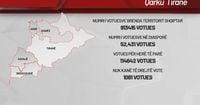In the upcoming elections on May 11, 2025, the Tirana district is poised to play a crucial role in shaping Albania's parliamentary landscape. With 913,415 citizens eligible to vote, alongside 52,431 voters registered from the Diaspora, the stakes are high for all political entities involved. The number of parliamentary mandates for the Tirana district has seen a steady increase over the years, reflecting the region's growing population and political significance.
Historically, the number of mandates has evolved significantly; in the 2009 and 2013 parliamentary elections, there were 32 mandates. By 2017, this number rose to 34, and in 2021, it reached 36. For the 2025 elections, Tirana will gain an additional mandate, bringing the total to 37 seats in the Assembly. This increase underscores the importance of the Tirana district, which now accounts for 26% of the seats in parliament.
Among the voters, 114,642 young people will be casting their votes for the first time, while 1,081 individuals are ineligible due to decriminalization. The Tirana region encompasses five municipalities: Tirana, Vora, Kavaja, Rrogozhina, and Kamza, all contributing to the district's electoral dynamics.
In a competitive political landscape, 11 political entities are participating in the elections, three of which are coalitions. Voters will be directed to 1,882 voting centers across the region. The Democratic Party (DP) and the Socialist Party (SP) are leading the charge, with Sali Berisha and Edi Rama at the helm of their respective lists. The Socialist Party has appointed political leaders Ogerta Manastirliu and Elisa Spiropali to oversee the campaign efforts in the Tirana district, while the Democratic Party has entrusted Belind Këlliçi with the campaign.
Each political party has submitted 12 names on their closed lists, while 37 names are registered for the open lists. This electoral strategy allows voters to have a say in who represents them, adding a layer of engagement to the voting process. In the previous elections of 2021, the Socialist Party secured 18 seats, the DP obtained 15, the LSI (now the Freedom Party) won 2 seats, and Tom Doshi's SP acquired 1 seat. Notably, the last seat in Tirana during the 2021 elections was clinched by the DP with 12,156 votes, setting a benchmark for new political parties aiming to gain representation in the capital.
As the elections approach, accusations of electoral misconduct have surfaced. On May 9, 2025, Belind Këlliçi, the Democratic Party's political leader for Tirana, made a strong public denunciation regarding alleged vote-buying activities. In a press statement, Këlliçi claimed that the ambulance network of Tirana's public hospitals would transform into an "electoral caravan" distributing money to purchase votes. He asserted, "Reliable information received by the Democratic Party confirms that the ambulance network of Tirana's public hospitals will turn into an electoral caravan tonight, distributing money for the purchase of votes. Edi Rama's patrons will take to the streets tonight, using the means of transport of patients and the sick as ATMs to buy the will of voters."
Këlliçi did not hold back in his criticism, calling on the Special Prosecution Against Corruption and Organized Crime (SPAK) to activate the Election Task Force to investigate these claims. He warned hospital directors and those responsible for the ambulance network against engaging in what he termed an "open violation of the law," threatening that they would be held accountable as "electoral terrorists." He further emphasized the implications of state interference in elections, stating, "Whoever steals the elections has their fate clearly written in Washington, Brussels, and Berlin!"
This public denunciation adds a layer of tension to the already competitive electoral landscape in Tirana. Këlliçi's statements reflect a growing concern over the integrity of the electoral process, particularly as the country moves closer to the elections. The Democratic Party's allegations highlight the ongoing challenges faced by political entities in ensuring fair and transparent elections.
As the electoral date approaches, the focus will be on how these allegations unfold and whether they impact voter turnout and party strategies. With a significant number of young voters participating for the first time, the 2025 elections in Tirana may not only determine the composition of the Assembly but also set the tone for Albania's political future.
As citizens prepare to head to the polls, the eyes of the nation will be on Tirana, where the electoral race is not just about seats in parliament but about the very integrity of the democratic process. With the stakes higher than ever, the upcoming elections are poised to be a pivotal moment in Albania's political history.




